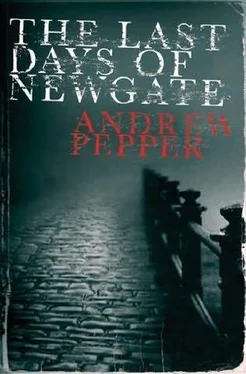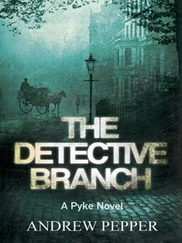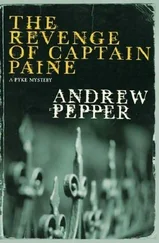Andrew Pepper - The Last Days of Newgate
Здесь есть возможность читать онлайн «Andrew Pepper - The Last Days of Newgate» весь текст электронной книги совершенно бесплатно (целиком полную версию без сокращений). В некоторых случаях можно слушать аудио, скачать через торрент в формате fb2 и присутствует краткое содержание. Жанр: Исторический детектив, на английском языке. Описание произведения, (предисловие) а так же отзывы посетителей доступны на портале библиотеки ЛибКат.
- Название:The Last Days of Newgate
- Автор:
- Жанр:
- Год:неизвестен
- ISBN:нет данных
- Рейтинг книги:4 / 5. Голосов: 1
-
Избранное:Добавить в избранное
- Отзывы:
-
Ваша оценка:
- 80
- 1
- 2
- 3
- 4
- 5
The Last Days of Newgate: краткое содержание, описание и аннотация
Предлагаем к чтению аннотацию, описание, краткое содержание или предисловие (зависит от того, что написал сам автор книги «The Last Days of Newgate»). Если вы не нашли необходимую информацию о книге — напишите в комментариях, мы постараемся отыскать её.
The Last Days of Newgate — читать онлайн бесплатно полную книгу (весь текст) целиком
Ниже представлен текст книги, разбитый по страницам. Система сохранения места последней прочитанной страницы, позволяет с удобством читать онлайн бесплатно книгу «The Last Days of Newgate», без необходимости каждый раз заново искать на чём Вы остановились. Поставьте закладку, и сможете в любой момент перейти на страницу, на которой закончили чтение.
Интервал:
Закладка:
He was a thin man with bushy whiskers and translucent skin that contrasted strangely with his thin lips. A depressive character with few friends and fewer social graces, his only joy in life, as far as Pyke had been able to tell, was inspecting his ledger books in order to determine his financial worth.
But Pyke was under no illusion about the threat that Flynn posed to him. He would slit Pyke’s throat without giving it a moment’s thought.
The ward itself was a narrow room, lit only by a fire that burned at one end; it housed twenty or thirty men, most of whom were huddled under blankets around the fireplace. Though the stone walls were thick, they appeared to keep in little of the heat. It was a sombre place, and as he was led across to the wardsman, Pyke felt the hard stares of his fellow prisoners. Three years earlier, another Bow Street Runner had been imprisoned for theft; during his first night on the ward, someone had stabbed him in the neck. No one had admitted to the attack. The Runner had died and, as his corpse was dragged away, other prisoners had clapped and cheered.
The wardsman introduced himself as Jack Cotton. Pyke ignored the scar that ran down one side of his face and offered him ten guineas as an act of good faith. Grinning, Cotton accepted the money without hesitation and led Pyke to a hemp-rope mat near the fire, gave him a horse blanket which he tugged away from another prisoner, put a platter of cold meat in front of him and produced a tankard of porter, which he thrust into Pyke’s hand, along with a wad of tobacco.
Next to him, a toothless man with a boil on his forehead said, ‘So you’re the one they been talkin’ about.’ He broke into a chuckle and edged his own mat away from Pyke’s. ‘Sleep tight and don’t let the bedbugs bite.’ From the other side of the fireplace, a man stared at Pyke and spat snuff from his bruised lips. In one of the darkened corners, a half-naked man defecated and far away at the back of the ward, a young boy sobbed. Flynn watched the proceedings from a distance, his arms folded.
It was Pyke’s plan to withdraw a little from the group huddled around the fire and try to remain awake during the night. It seemed inevitable that Flynn would make his move at some point, knowing as he would of Pyke’s plans to be transferred, and Pyke wanted to be prepared for him. When the attack came, he had to act quickly; the last thing he wanted was a prolonged struggle, one that might encourage others to join in on the receiver’s side.
From his position about ten or fifteen yards back from the fire, Pyke watched the men drink, gamble, laugh, swear and swap tall stories; soon they seemed to have forgotten his presence. Later, when the fire dwindled and the men passed into sleep, he listened for signs of his assailant but heard nothing. Eventually he feigned sleep in order to try to entice Flynn into action. A solitary rat scuttled past him, its claws scuffing against the wooden floorboards. Beside him the platter of meat and the tankard of porter remained untouched. He did not trust them not to have been tampered with.
When it came, Flynn was much stealthier and stronger than Pyke had imagined he would be. From nowhere, he pounced upon Pyke like a wild animal. At the same time Pyke felt something splash him in his face and sting his eyes. Later he realised that it was urine. The stinging sensation momentarily disabled him, and had Flynn been armed with a knife instead of a garrotting rope his attack might have been successful. Digging his knees into Pyke’s arched back, the receiver tried to force the rope over his head, but Pyke was, in the end, the more powerful of the two, and he threw the older man in one jerk on to the hard floor, grabbing his throat with one hand, taking the rope with the other and threading it carefully around Flynn’s own neck, before pulling it tight.
The older man spluttered and choked, but Pyke had neither the resolve to finish him off nor the desire to deal with another corpse. Releasing the rope, Pyke hauled the receiver up on to his shaking legs and pulled him close enough to be able to smell his breath. ‘You made a bad decision and now you’re paying the price.’
‘Maybe they’ll hang us together.’ Flynn wiped spittle from his mouth.
‘I’m a thief-taker, not a thief.’
‘And now someone’s taken you,’ Flynn said, with a sneer.
‘Maybe I’m not as corrupt as you think I am.’
‘I don’t think you’re anything, Pyke.’
‘If you come within a hundred yards of me again, I will kill you. Is that understood?’
Flynn looked down at the floor.
Pyke hit him in the mouth with such ferocity that one of the man’s teeth lodged itself in his knuckles. Flynn collapsed in a heap. No one came to his assistance; in fact, no one seemed to be concerned by what had happened.
The following day Pyke paid ten guineas to the turnkey and a further thirty guineas was earmarked for the governor. He was transferred to a comfortable private room in the infirmary. If he had been a gentleman, the turnkey told him, then a little extra money might have secured him a place in the governor’s own quarters, but as it was, the infirmary was the best that a man of his breeding could hope for. Once ensconced in his room, Pyke ordered a new set of clothes, a bedstead with a sound flock mattress, additional blankets, a choice of newspapers, a copy of Machiavelli’s The Prince, writing paper, envelopes, a blotter and a pen, a chair for reading, a pint of gin, a pint of beer, a platter of cold joints and hams, two loaves of bread, a pipe and an ounce of tobacco.
It was a spartan room, warmed only by a small fire. Attached to the wall there was a crucifix, which he removed and threw under the bed.
As well as being private, the room was heavily fortified. It was locked from the outside by three solid bolts and guarded by two men; the only natural light came from a light-well built into the upper wall and fortified with iron bars.
Pyke persuaded the turnkey, with the governor’s permission, to remove his handcuffs but the leg-irons remained. It was a condition of the agreement that saw him move from the ward to the infirmary.
The arbitrariness of the legal system did not surprise Pyke. He had witnessed sufficient abuses of power and privilege in his time as a Bow Street Runner to immunise him against any romantic notion that the English system of justice, unlike, say, its French counterpart, was fair-minded and all men were somehow equal under the law. The French had their Bastille; the English had Newgate. And while he had long since heard of plans to close and demolish the ancient prison, symbol of a regime that was as much feared as it was hated, Pyke was under no illusion that a necessarily fairer system of incarceration and punishment would take its place.
Pyke was personally distrustful of all legal and political institutions, and believed individuals prospered not by pursuing some ‘worthy’ vision of moral betterment through civic and legal reforms, but by showing superior cunning and ferocity in the face of opponents. Success, or in his case freedom, wouldn’t come about through an appeal to the fairness of the law, but rather as a result of his own guile or through the discretionary authority exercised by Peel.
What bothered him most was his own impotence in the face of a system whose sole purpose seemed to be to destroy him. As a result of past successes, Pyke had naively come to believe in his own invincibility. Though he had never laid claim to radical sentiments, he had always felt able to tilt circumstances to his advantage. Now someone had decreed that he was to be sacrificed, and against this type of power his resourcefulness finally seemed a poor match.
But Pyke’s righteous sense of injustice did not colour his every thought. Nor did he permit himself to indulge in fantasies of revenge. Nor even was he angered by the fact that he had been abandoned by his old acquaintances; he had heard nothing from Sir Richard Fox or indeed from Peel. Rather, his enforced solitude gave him the chance to sift through what had happened.
Читать дальшеИнтервал:
Закладка:
Похожие книги на «The Last Days of Newgate»
Представляем Вашему вниманию похожие книги на «The Last Days of Newgate» списком для выбора. Мы отобрали схожую по названию и смыслу литературу в надежде предоставить читателям больше вариантов отыскать новые, интересные, ещё непрочитанные произведения.
Обсуждение, отзывы о книге «The Last Days of Newgate» и просто собственные мнения читателей. Оставьте ваши комментарии, напишите, что Вы думаете о произведении, его смысле или главных героях. Укажите что конкретно понравилось, а что нет, и почему Вы так считаете.












